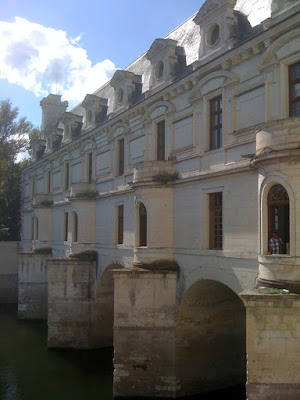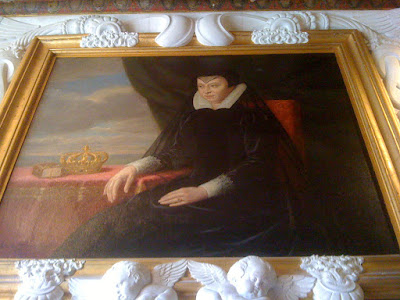Français (English below) :
Aujourd'hui nous avons visité ce château magnifique, Le Château de Chenonceau, aussi surnommé Château des dames.
Pourquoi château des dames ? À cause de toutes les femmes qui ont eu la charge et qui ont été impliquées dans la construction, la reconstruction ou la rénovation de ce château, des femmes qui étaient également des propriétaires ou co-propriétaires du château.
Pour vous donner une image de qui je parle, je peux mentionner quelques noms de ces femmes, pas tout à fait inconnues :
Katherine Briçonnet, qui a édifié le château en 1513, Diane de Poitiers qui a enrichi le château, Catherine de Médicis qui l'a agrandi. Louise de Lorraine faisait du château un lieu de recueillement, Louise Dupin a sauvé le château et Madame Pelouze l'a métamorphosé.
Ci-dessous quelques photos et si vous cliquez sur le nom du château ci-dessus, vous tomberez sur le site internet.
English:
Today we visited this magnificent castle, Le Château de Chenonceau (The Chenonceau Castle), also called The Castle of the Ladies.
Why castle of the ladies? Because of all the women who have been in charge of or implicated in the construction, the reconstruction or renovation of this castle, women also being owners or co-owners of the castle.
To give you an idea of whom I speak, I can mention a couple of names of some, not totally unknown, women:
Katherine Briçonnet, who built the castle in 1513, Diane De Poitiers who enrichened the castle, Catherine de Médicis who enlarged it. Louise de Lorraine made it a place of contemplation, Louise Dupin who saved the castle and Madame Pelouze who totally transformed it.
Below some photos and if you click on the name of the castle above, you will find yourself at the internet site of the very same castle.
Le Sphinx à l'entrée du château
The Sphinx by the entrance to the castle
La fin de la grande allée d'honneur
The end of the honorary colonnade
Le Château avec la Tour des Marques
The Castle with the Marques Tower


Façade Orientale avec Le Cher
The Oriental facade with the river Cher



Jardin de Catherine de Médicis
The garden of Catherine de Médicis

Une partie de la Salle des Gardes
A part of the Guardians or Wardens Hall
La Chapelle
The Chapel
Lit à baldaquin du XVIIe siècle
A canopy bed from the 17th Century
Manteau supérieur de la cheminée avec les
initiales de Catherine de Médicis et Henri II
dans la chambre de Diane de Poitiers
The upper chimneypiece with the initials of
Catherine de' Médici and Henry II of France
in the room of Diane de Poitiers.
Catherine de Médicis. Portrait par Piat Sauvage
accroché sur la cheminée.
Catherine de' Medici by the painter Piat Sauvage
hanging on the upper part of the chimney

La chambre et le lit de Catherine de Médicis
The room and bed of Catherine de Médicis

La cheminée dans le Salon Louis XIV
The chimney in the parlor of Louis XIV

Plaque commémorative dans la grande Galerie
du château, en mémoire des blessés de la
Première Guerre mondiale, soignée au château grâce
aux Gaston et Simonne Menier.
Commemorative plaque in the Big Galery of
the castle, in memory of the wounded during
the First World War, nursed at the castle thanks to
Gaston and Simonne Menier.
La Galerie du Rez-de-Chaussée
The Galery on the ground floor
Fenêtre sur cour ? Non, pas tout à fait
Rear Window? Not, not quite.
Les cuisines
The kitchens

Le potager. Plus important que des jardins de fleurs à l'époque
The vegetable garden. More important than flower gardens at the time
The end of the honorary colonnade
Le Château avec la Tour des Marques
The Castle with the Marques Tower


Façade Orientale avec Le Cher
The Oriental facade with the river Cher



Jardin de Catherine de Médicis
The garden of Catherine de Médicis

Une partie de la Salle des Gardes
A part of the Guardians or Wardens Hall
La Chapelle
The Chapel
Lit à baldaquin du XVIIe siècle
A canopy bed from the 17th Century
Manteau supérieur de la cheminée avec les
initiales de Catherine de Médicis et Henri II
dans la chambre de Diane de Poitiers
The upper chimneypiece with the initials of
Catherine de' Médici and Henry II of France
in the room of Diane de Poitiers.
Catherine de Médicis. Portrait par Piat Sauvage
accroché sur la cheminée.
Catherine de' Medici by the painter Piat Sauvage
hanging on the upper part of the chimney

La chambre et le lit de Catherine de Médicis
The room and bed of Catherine de Médicis

La cheminée dans le Salon Louis XIV
The chimney in the parlor of Louis XIV

Plaque commémorative dans la grande Galerie
du château, en mémoire des blessés de la
Première Guerre mondiale, soignée au château grâce
aux Gaston et Simonne Menier.
Commemorative plaque in the Big Galery of
the castle, in memory of the wounded during
the First World War, nursed at the castle thanks to
Gaston and Simonne Menier.
La Galerie du Rez-de-Chaussée
The Galery on the ground floor
Fenêtre sur cour ? Non, pas tout à fait
Rear Window? Not, not quite.
Les cuisines
The kitchens

Le potager. Plus important que des jardins de fleurs à l'époque
The vegetable garden. More important than flower gardens at the time







































